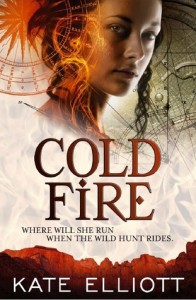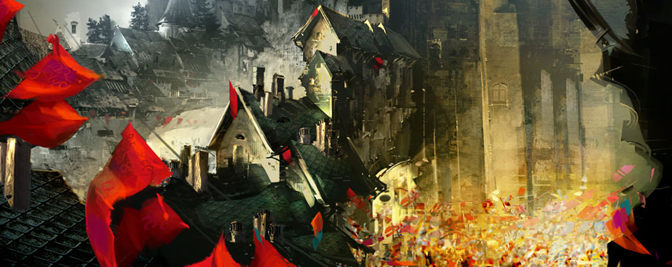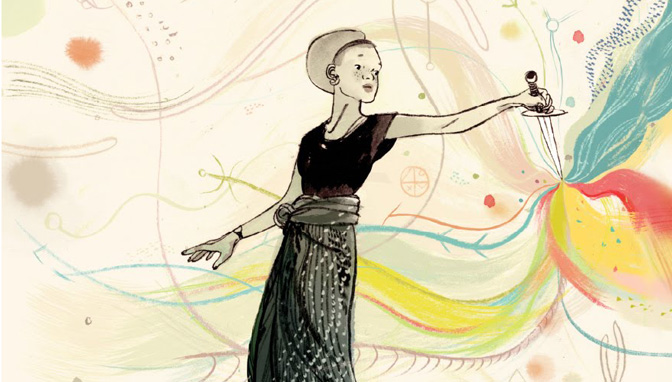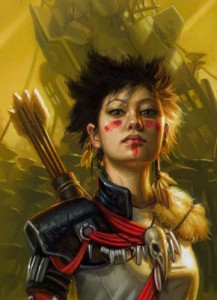 I wanted to write a post about diversity.
I wanted to write a post about diversity.
It could open something like this: In a diverse world, is fantasy and science fiction literature open to the largest possible view of the world and its cultures? If not, why not? What am I as writer, as reader, and as viewer doing to promote and highlight a more realistic view of the world’s diversity?
But such an opening already presupposes that I’m writing from the stance of a cultural hegemony centering around Euro/American settings and its structural, political, historical, and religious backdrops. The phrase “a more realistic view” already situates me within a US-centric sphere. It begs the question: More realistic than what?
The instant I say “diversity” what I mean, whether I want to or not, is that I’m writing to an audience in which the default mode lies in being male, white, and mostly straight. Or, to quote writer Aliette de Bodard, the [phrase] “‘importance of diversity’ boils down to ‘why white people benefit from seeing POCs in fiction.’”
POC, for those of you who may not know this acronym, in this instance stands for ‘people of color.’ I agree with Bodard, and I want to add that for the purposes of this post, I’m speaking of diversity in its largest sense, to include gender, gender identity, ethnicity, race, religion, nationality, language, class, and so on.
I’m weary of having this conversation over and over again.

My first novel was published in 1988. I’m still having and reading the same conversations about the representation of women, of people of color, of LGBTQ people, of non-US or non-Western cultures in fiction. There’s more “audible” talk than I personally recall from before about the Anglophonic bias in our field and the obstacles that writers from outside the Western Anglophonic regions face (although this conversation was happening back when I broke in also, albiet in a more limited sphere). However, I’m not able to speak to how writers and readers who aren’t situated in the big US/Canada/UK/Aussie/NZ markets feel about their in/visibility.
With the rise of social media, there are definitely more diverse (i.e. not white and/or male and/or heterosexual and/or Anglophonic) voices involved in this discussion than before, but the default really hasn’t shifted much. If it had, I wouldn’t still be trotting out the word “diversity.” Instead, the field’s literature and depictions would simply be more diverse.
You know what?
It’s amazing the things we know, that are actually wrong.
When I was in college, I remember being told by a guy that there were no women composers before the 20th century. He added that even counting the few from the 20th century, none mattered regardless because women simply did not possess the genius to compose. It was what his music history classes as they were taught in that era revealed. The invisibility of women as well as his ignorance and dismissal of any musical tradition outside of Western Classical Music constituted part of his world view.

The beauty of such assertions and the unspoken and unexamined assumptions behind them is that they are mirrors that reflect themselves back on themselves.
People’s assumptions get in the way of their ability to think past received wisdom.
To my mind, this is a fundamental problem when it comes to suggesting there should be more diversity in portrayals of character and culture in, say, epic fantasy or fantasy in general. People’s assumptions get in the way of their ability to think past received wisdom. It can get in the way of a reader’s ability to read a work if it seems to them to violate what they are sure they know. It can get in the way of a writer’s ability to think outside his/her normative ideas about what a fantasy world that is “authentic” must look like. Assumptions create obstacles that impede the introduction of more diversity of experience into a world and its characters.
Let’s say my unexamined understanding of the European Middle Ages means I view the era as a monolithic block where the oppressed women of the time were in constant danger of having sexualized violence perpetrated on them, where women had no lives outside of their relationship with a man who gave them guardianship or money, and where they could barely be said to have personality because they were too oppressed and socially inferior and ignorant to have personalities. If this is what I think I know, then my attempts to read—much less write!—a fantasy story with women who do not fit those limited and limiting parameters will fail. Understandably so, since to write outside those assumptions means my normative ideas will have been transgressed. How unrealistic a more “diverse” story will seem to a reader or writer whose views of the past are mired in these sorts of errors. How flawed, even though it actually isn’t.
Attempts to add “diversity” into such a scenario then remain trapped in the same box, regardless of the axis of diversity: The “diversity” becomes an ornamental or utilitarian element being forced onto the “real” underpinnings of the world (which remain in such a case as the default male, white, Western, straight, whatever), rather than being an intrinsic part of the creation.
To me, humans are pattern makers: We structure the landscape around us into patterns to try to make sense of it. I mean landscape in the largest sense of the word, not just the physical environment but also the historical, spiritual, political, cultural, and relational environment. Human beings are “band animals.” We evolved in groups, not as individuals forging alone through the Paleolithic wilderness scorning companionship and cooperation as sops for the weak-willed. We mostly are in constant interaction with others, for good or for ill, and there is plenty of both good and ill to go around.
Every culture, and every group of people within a culture, tells stories about the past and present that help define how people see themselves. I think that people naturally create a narrative about who they are and where they fit in the world as a way to try to understand the immensity of the world and the relative insignificance of their own small, personal life within the greater whole.
What has this to do with diversity in fantasy?
Diversity is not an ornamental element. It’s not something “we” need or ought to “add” to our stories to fulfill some moral quota or to get critics off our backs. That’s not what “a call” for diversity means. The writers and readers who are already writing and seeking “more diverse” fiction don’t need to be told or have anything suggested to them. They’re living it.
 The stories people tell make and reveal patterns. They unfold and invoke a vision of a world.
The stories people tell make and reveal patterns. They unfold and invoke a vision of a world.
By that I do not mean that our stories are a mouthpiece for our views of the world or that our characters are speaking for us. They aren’t (with, I am sure, some exceptions). Nor have I any interest in telling people what to write. I figure people should have the freedom to write the story that is in them to write.
Stories reveal something of what aspects of the world are visible to us and who and what we deem important. That is why I believe it is such a simple but profound act to truly stop and think through—and then think beyond—the foundational assumptions out of which one creates a narrative.



Outstanding.
Excellent points. I’ve lost count of the number of reviewers who were surprised at my portrayal of Elizabethan (homo/bi)sexuality, because they had internalised the view that openness about gay sex was a late 20th/early 21st century phenomenon. Yeah, not so much. The past is not just another country, it is as Kate says a very diverse landscape compared to the simplistic impressions we gain from old school textbooks and Hollywood movies.
Thanks, Kate.
Indeed, as Anne says upstream, one of the challenges in writing fantasy borrowing from or directly set in the past is that our misconceptions get in the way of being truthful.
There is a whole bucket of stuff to unlearn about history and the roles of women, minorities and lots of other things in it.
For example (Kate is going to smile at this one coming from me), what about the first African-Roman emperor, Septimius Severus? He founded a dynasty, even.
The most difficult part of writing about a world that is different fron ours, in its cultural norms as well as in its physical laws or geography or temporal setting, is portraying how people would really think and behave differently in such a world. The missing link in worldbuilding for most authors is creating characters who have internalized the different norms and assumptions that would have shaped their lives in that world, if the story was making any attempt at psychological realism.
Too often you find stories set tens of millenia in the future on worlds far distant from Earth where the characters think and behave as if they grew up in the United States of the 1950s (or 1990s or whatever the decade of publication was). Or stories in which any element of cultural diversity is bolted on rather than organic, where an “as-you-know-Bob” monolog will inform you that “no one believes in religion any more” or “anyone can change gender whenever they want” but where nothing in the inner lives of the characters reveals the different thought processes or life assumptions that would come from such a profound alteration in society.
Three older historical novels with fantastic elements serve as reminders that one can write about a very different time and place and immerse the reader in what is often a very alien way of thinking, which the characters simply inhabit, without ever explicitly describing it: Mary Renault’s “The King Must Die”, Henry Treece’s “Amber Princess”, and Naomi Mitchison’s “The Corn King and the Spring Queen”. We’re seeing more successful attempts at this nowadays, often from authors who don’t belong to the hegemonic default categories, but it is obviously not easy to execute.
This was a really interesting read. I wonder what kinds of concrete examples you could use to illustrate your insightful points. I wonder how, for instance, you would deconstruct what George R. R. Martin does with his novels, which are head and shoulders above most other fantasy, but which definitely perpetuate some of the “patterns” that you describe. Anyway, really interesting.
Doug: Thanks.
Anne: Views of sexuality in times before ours is a classic example of reading our own time into the past. And not just our own time — Americans (forex) do this cross culturally as well.
Paul: I didn’t know that about Septimius Severus! But I should have.
Paul, exactly, and well said.
I can see my own evolution in this regard through my books in which earlier novels have more of that “this is my modern thought process and assumption driving the not-modern (whether fantasy or sf) setting.” I am much more conscious now of trying to avoid that, and yet regardless I still often feel I am at best a tourist seeing things from a shallow immersion in a theoretically deeper place that is limited by my own defaults.
Neal, Martin is an interesting case. He really does “narrative drive” better than anyone. I don’t mean by that just the “page turning” aspect of writing but the larger sense of a balance between character and plot that drives the reader to get involved in and want to carry forward with the story. His major characters are vivid and easy to tell apart (it’s remarkable how many characters readers know by name; quite a lot, when you think about it).
And he really does have more major and secondary female characters who matter in the plot than any other male epic fantasy writer. I admire that.
For me (and I’ve only read the first 3 books), I do find that the books tend to fall into the comfortable patterns of how Americans like to look at the world. I don’t see them as pushing any envelopes in that sense with gender or diversity; I find them to be very “normative,” if you see what I mean.
However, my perspective is just one way of approaching the books. I think there may be many readers for whom Martin does push the envelope of some of their expectations about gender and diversity even if he doesn’t for me.
[…] Kate Elliott on It’s Amazing the Things We Know, That Are Actually Wrong. […]
[…] Kate Elliott, “It’s Amazing The Things We Know, That Are Actually Wrong”: http://aidanmoher.com/blog/2012/06/articles/its-amazing-the-things-we-know-that-are-actually-wrong-b… […]
As someone heavy into SF + F, I regret I never picked up one of your books before last month.
I’m east African and, having grown up in North America, I can tell you it’s always been disheartening for me… the state of fiction. Groups of peoples and sections of society simply don’t exist in the minds of certain writers, or, are just afterthoughts. Anyway, other than my sisters, I’ve never heard anyone express something even somewhat similar to your post with regards to writing. So. Apparently, you don’t have to be from an outside culture to see an inequity.
Stories reveal something of what aspects of the world are visible to us and who and what we deem important.
Ultimately? Yeah. Even more so at novel length.
Anyway, I liked/agreed with pretty much every point you made. How did you reply to that male student?
Thank you for writing this. <3
P.S. LOVED Cold Magic and Cold Fire (and looking forward to reading the rest of your titles!). It had, for me, probably one of the most exciting fantasy worlds to discover. And Cat and Andevai are just adorable.
[…] “It’s Amazing the Things We Know, That Are Actually Wrong” by Kate Elliott | A Dri… “It begs the question: More realistic than what?” […]
[…] the same subject, Kate Elliott at A Dribble of Ink writes about how calls for more diversity in science fiction and fantasy assume a default of Whiteness, heteronormativity, and the […]
Mira,
sorry to be replying to your comment so belatedly as I had a busy week and hadn’t checked back here for ten days!
Thank you for your comment. My mother is an immigrant. Growing up with an immigrant mother I believe gave me a sense of being one step outside the mainstream culture because we did things in the house that were a little different than what everyone else did, and as well I have relatives who are not USians, so I was always aware of how much exists outside the rather small frame of reference that is “normative” US culture.
As for the male student, to be honest, back in those days, there wasn’t much to be said. I had a suspicion he was wrong, but women composers weren’t taught. Now, of course, it would be much easier for me to respond. But I also remember in high school being pulled aside by the other “smart kid” in school who informed me that scientific studies had proven that women weren’t as smart as men (and that therefore, he implied, I could not be as smart as him), and I just laughed at him.
I feel strongly these are issues that we have to speak more loudly about, and I do think that in science fiction and fantasy (the professional community I know best) many people are talking about them. Not enough, but more and more as the field widens.
Finally, thank you for the kind words about Cold Magic and Cold Fire. I have really enjoyed writing the series, and particularly Cat and Andevai.
[…] “It’s Amazing the Things We Know, That Are Actually Wrong” by Kate Elliott […]
[…] default mode lies in being male, white, and mostly straight.” With a focus on fantasy fiction, Kate Elliott writes about dominant cultural narratives and how they impact our ability to conceive and interpret truly creative […]